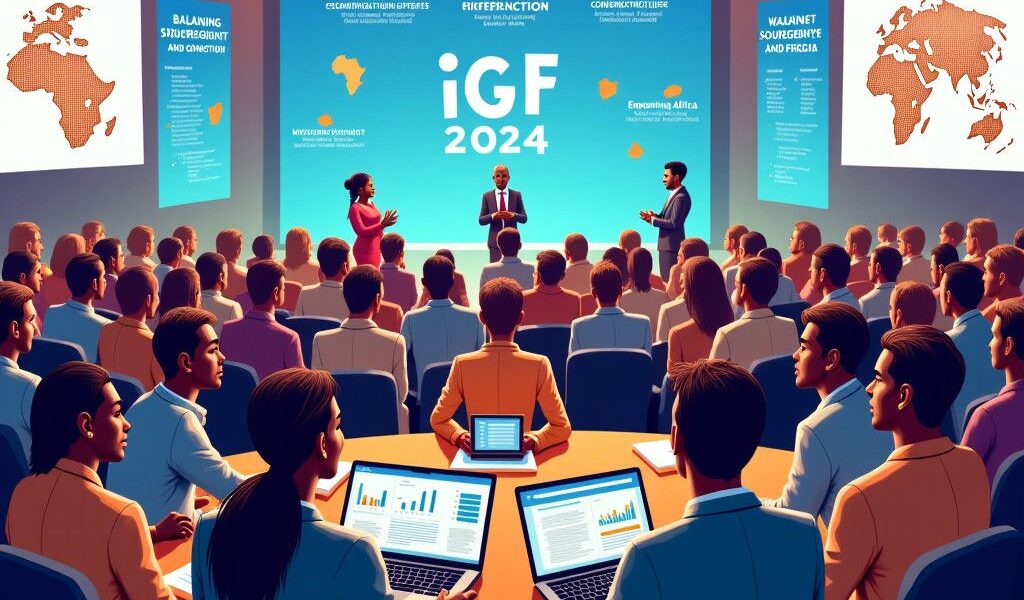Balancing Digital Sovereignty and Economic Growth in Africa: Insights from IGF 2024
At the recently concluded Internet Governance Forum (IGF) 2024, stakeholders convened to tackle a pressing issue: how to achieve a delicate balance between digital sovereignty and economic growth in Africa. This complex discussion came in the wake of various challenges regarding data localization, regulatory frameworks, and innovative solutions that could promote both local control and economic advancement.
One of the main topics highlighted during the IGF was the critical importance of data localization policies. These regulations, aimed at keeping data within national borders, are increasingly being adopted by countries across Africa. However, such policies can pose significant challenges for businesses that rely on cross-border data flows. A case in point is Nigeria, whose data protection regulations have driven companies to establish local data centers. While this could strengthen data security and privacy, it may also lead to increased operational costs and complexities for enterprises looking to serve customers in multiple regions.
Experts at the forum underscored that harmonizing these policies is essential for Africa’s digital landscape. For instance, without consistent regulations across borders, businesses might struggle with compliance, ultimately affecting their growth prospects. Speakers emphasized that a collaborative approach among nations is necessary. This framework could potentially mirror successful initiatives in Europe, where the General Data Protection Regulation (GDPR) has encouraged a more unified stance on data privacy, which in turn has facilitated smoother operations within the European Union.
A significant barrier to achieving this balance is the lack of local expertise in shaping and implementing effective data legislation. Many African countries still grapple with skills shortages in IT and legal sectors that are pivotal to developing sound digital policies. To address this, the IGF 2024 highlighted the need for investment in local education and training programs. For example, partnerships between universities and technology companies could produce locally trained professionals equipped to navigate the complexities of digital governance.
Furthermore, innovative solutions were also discussed at the forum. One of the more exciting proposals was the establishment of solar-powered data centers, as championed by some panelists. This initiative not only aims to address electricity challenges that plague many African nations but also seeks to promote sustainability in contrast to traditional energy sources. Such data centers could serve local businesses by providing the required infrastructure while filling a crucial gap in the energy landscape.
Additionally, the conversation at the IGF revealed the pressing need for incorporating technological innovations into policy-making processes. By leveraging technologies like blockchain, governments could create transparent systems that bolster trust among users. For example, blockchain technology can provide secure and verifiable ways to manage consent and data usage, thus ensuring that local and international regulations are met without stifling economic activity.
Private sector involvement will also be key in driving growth alongside digital sovereignty. The forum highlighted various success stories from African tech companies that have thrived by creating locally relevant solutions. These firms are often better positioned to respond to the needs of their communities than large multinational corporations. Encouraging such local entrepreneurship could create jobs and spur innovation, allowing for a more sustainable economic model.
As Africa navigates its digital journey, the discussions at IGF 2024 serve as a crucial reminder that pursuing digital sovereignty does not mean shunning growth. On the contrary, by integrating local expertise, fostering innovation, and collaborating regionally, African nations can forge a path that secures both their digital futures and economic development.
In conclusion, balancing digital sovereignty with economic growth is an ongoing challenge that requires collective effort. The insights shared at IGF 2024 reflect a recognition of the complexities involved but also an overwhelming potential to harness digital transformation for the benefit of all Africans.








